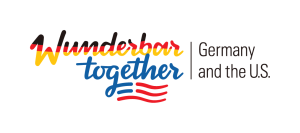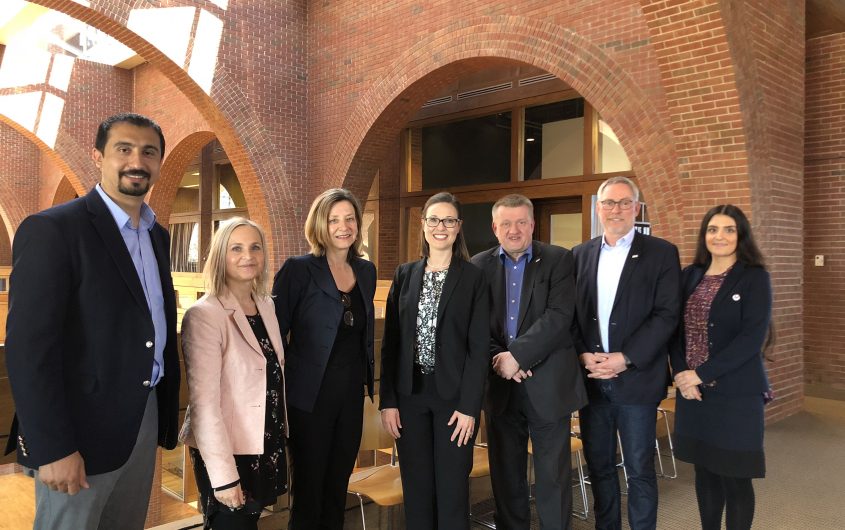
AICGS
Wunderbar Together in Southwestern USA
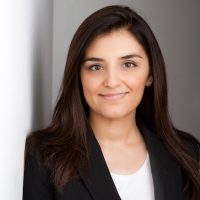
Çiğdem İpek
German Federal Chancellery
Çiğdem İpek is a desk officer at the Federal Chancellery’s Office of the Federal Government Commissioner for Migration, Refugees and Integration. Ms. İpek’s focus lies in education and research in relation to migration and integration in Germany.

Markus Lötzsch
Nuremberg Chamber of Commerce and Industry
After completing vocational training as a qualified banker in Frankfurt, Markus Lötzsch graduated in law sciences. After initially working in a law firm in Munich and for the Bavarian Ministry of Economic Affairs and Media, Energy and Technology, Mr. Lötzsch was employed as deputy managing director at “Bayern International GmbH” and chairman of the managing board of “Wirtschaftsförderung Sachsen GmbH” (Promotion of Economic Development in Saxony).
Since 2008, Markus Lötzsch has been the Chief Executive Officer at the Nuremberg Chamber of Commerce and Industry, an organization of around 145,000 member companies. The philosophy of the Nuremberg Chamber of Commerce and Industry is self-governance of the private sector economy.
The Nuremberg Chamber of Commerce and Industry supports the integration of refugees through programs that help find vocational training and employment. Check.work is an assessment procedure consisting of two modules to analyze potential and assess skills. Module 1 assesses existing skills, knowledge, and abilities; it is image based and can be completed without extensive language skills. Module 2 assesses interests, likes, and dislikes using simple German language. AzubiScouts provides an opportunity for trainees with a migrant bbackground to visit BIK school classes (special classes for young immigrants) and present the Vocational Education and Training system and the associated career paths. They also host job fairs to bring together refugees and employers and consultation hour, an open consultation hour for immigrants, where it is possible to get advice on training and job opportunities (on a drop-in basis, to avoid language-related barriers to making an appointment).
After refugees have found vocational training, the Nuremberg Chamber of Commerce and Industry provides support to prepare for training and continues to do so for the duration of the traineeship. AzubiStarterWoche (trainee starter week) is an induction week for immigrants before the vocational training program begins. The aim is specific preparation for the training program to avoid problems that might arise due to intercultural differences. AzubiStarterCoaching offers monthly support in the first year of the vocational training program with the aim of recognizing early on if someone is at risk of dropping out and taking counter-measures to ensure that they remain in the program. Immigrants who cannot complete a vocational education or training program for personal reasons can complete individual modules of a Vocational Training program (minimum of 6 months each) within the framework of the Modular Qualification Programme, a low-threshold program for adults over 25. The results for each module are confirmed in a certificate; over time this can even lead to a full professional qualification.
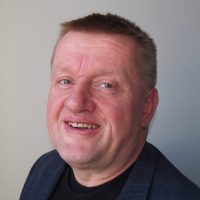
Rainer Aliochin
Ausbildungsring Ausländischer Unternehmer e.V. (AAU)
Rainer Aliochin is Chief Operating Officer at AAU e.V. in Nürnberg, Germany. He is also the project head at XeneX, where his work consists of consulting start-ups of existing immigrants in Germany, for immigrants who are abroad and want to move to Germany, and for refugees. XeneX is an IQ-MigraNet Project. He is also an enterprise coach for small and medium-sized enterprises (SMEs) regarding the employment of an international workforce. Mr. Aliochin is the representative of the AAU e.V. in regional and supra-regional networks and a member of the nationwide IQ-issue group “Migrantenökonomie” (migrant economics). He is guest lecturer at the University of BA, Mannheim, audited trainer in accordance with AEVO, a member of an examination board at the IHK (Chamber of Commerce) Nürnberg and acts as a consultant for start-up coaching initiatives of the BAFA (Federal Office for Economic Affairs and Export Control).
Mr. Aliochin completed a vocational education as industrial manager and received a Diploma in Business Administration from the University of Applied Science Nürnberg.
Partizip is an AAU e.V. program that offers day to day support for the integration of new immigrants and refugees. Entrepreneurs face special challenges when hiring and training newly-arrived refugees and immigrants at their businesses. Partizip supports this endeavor by fostering the social and intercultural skills of the workforce. The goal of the project is to sensitize Human Resources departments to intercultural communication in general, but also specifically with regards to the situation of newly-arrived refugees and immigrants. In consultation with businesses, AAU e.V. identifies intercultural challenges in companies and what support would be helpful for them. Partizip offers seminars and workshops on intercultural understanding; communication tips and techniques to avoid misunderstandings and conflict; informational materials about the situation of newly arrived immigrants and especially refugees; information about residency laws and legal issues; exchange within the network; establishment of tandems, and consultation appointments and individual evaluations with all participating companies.
Among the many programs AAU e.V. manages in the IQ Network Bavaria MigraNet Project, AQua—Recognition through Qualification (Anerkennung durch Qualifizierung) offers immigrants an opportunity to finish their partially completed vocational formation through targeted, adaptive qualification measures. The “AQua” Project supports persons with partial equivalent vocational qualifications to fulfill whatever is lacking in their qualification, with reference to their desired career. This can be a lack of theoretical knowledge or a lack of practical work experience. The goals for the initiative are achievement of full equivalent education by those with a partially complete education, development of marketable skills (through formal certification or increased competitiveness in the job market), and development of individual and tailored adaptive qualification training. Target groups for AQua are immigrants with “partial” recognition (as certified by the Chamber of Industry and Commerce Foreign Skills Approval [IHK-FOSA]), as according to the Professional Qualification Assessment Act (BQFG) and persons who are not likely to succeed in having their vocational training recognized. You can learn more about AAU e.V.'s IQ Network Bavaria MigraNet Project at http://www.aauev.de/project/iq-landesnetzwerk-bayern-migranet-projekte-des-aau-e-v/.
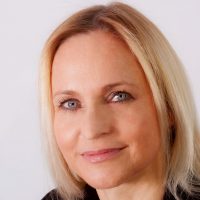
Ramona Lange
jumpp
Ramona Lange is a consultant, project manager, coach and author. She has been designing and implementing jumpp projects since 2007 and advises on the topic of self-employment in all phases, from orientation to growth. As the Hessian regional manager of the nationwide agency for female founders, which is affiliated to the founders' portal of the Federal Ministry of Economic Affairs and Energy (BMWi), she lobbies politicians on behalf of the association.
In 2012, Ms. Lange published a book called “Female Boss Wanted!”. It provides information and support for women who are preparing for their independence and self-employment. Her passions are future trends, developments and strategies. She creates social change and promotes equal opportunities, as well as co-creation and participation.
In the last year, she started a 3-year-pilot-project for female refugees at jumpp. This is based on the experiences from a preceding project for female migrants that she implemented in 2015 and 2016. The past and the present program both include mentorship, entrepreneurship education, hard & soft skills, networking and events. Both projects are/were funded by the The Federal Ministry for Family Affairs, Senior Citizens, Women and Youth and monitored and evaluated by the Institute for SME Research and Entrepreneurship (IFM) at the University of Mannheim. In the course of this collaboration, the partners prepared a handbook with guidelines and practice-orientated suggestions that helped transfer the knowledge & experience in a local, national and international context.
The currect project for female refugees received the nationwide “Wirkt! Siegel” certification by Phineo in 2018, which confirms that the programme is sustainable and effective. The concept of the female migrants and refugees project and some of its participants were even included as best practice examples in the UN publication “Policy Guide on Entrepreneurship for Migrants and Refugees” (Oct 2018).
In the course of the AGI project “Integration: Made in Germany” the group travelled through the Southwest region of the United States from March 17 to March 22, 2019. It is no exaggeration to call the very visit of this region a valuable and eye-opening experience that most participants were making for the first time. The project, being part of the Year of German-American Friendship or “Deutschlandjahr USA,” set out to bring together experts and practitioners of both countries for an intensive exchange on integration.
Throughout the week, the group was welcomed with open arms and keen interest in peer learning, which led to a constructive and open atmosphere in every meeting. Consequently, during the many site visits and conversations, participants shared their questions and even hesitations openly, the latter mostly concerning perceptions and misinformation on both sides of the Atlantic. As promised by AGI, we exchanged ideas, solutions, and best practices; however, we did so not only with our U.S. counterparts, but also among our group. It was inspiring to experience lively discussions with each other and learn new perspectives. We discussed employment and education opportunities, political and legal developments, as well as professional experiences. With every meeting, it became clear that our takeaway would not only consist of practical knowledge on best practice and concrete measures. Our learning also encompassed a rather factual and honest assessment of challenges integration advocates and experts are facing today. The United States, traditionally a country of immigrants, surprisingly finds itself in a seemingly new and perplexing debate about this very self-understanding. Integration no longer appears to happen naturally and without conflict. Germany, on the other hand, has recently been embracing the notion of being a country of immigration. Its experiences with integrating refugees and immigrants are, in comparison, relatively recent and not free of disagreements or conflict. It became evident that in both countries, integration efforts often take place at the local and community level. It also became clear that they do so against the backdrop of rising populism and nationalism. Thus, fostering a welcoming culture and leading by positive example seemed to be steps advocates for integration were taking in their communities. Visiting those communities and meeting peers across the Atlantic helped promote mutual understanding and learning, which will confidently lead to stronger ties between Germany and the United States.
We would like to extend our special thanks to Susanne Dieper, Liz Caruth, and the American-German Institute (AGI) at Johns Hopkins University, for organizing this project. It was truly wunderbar together!
